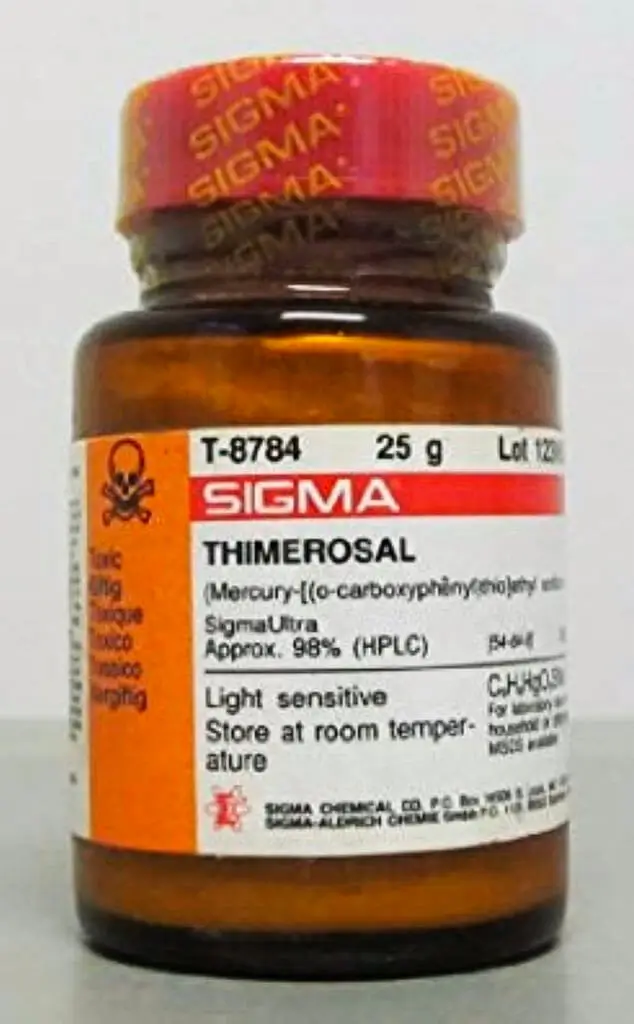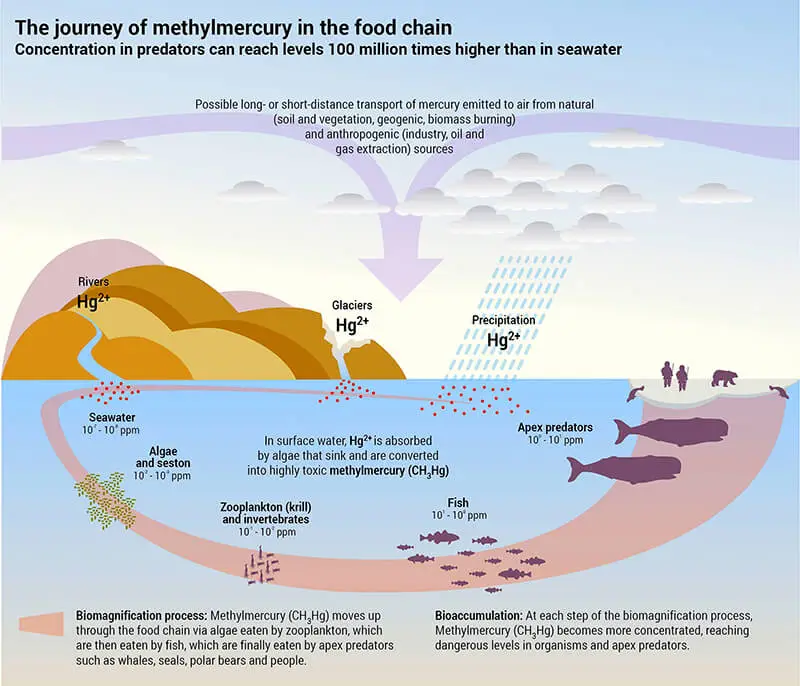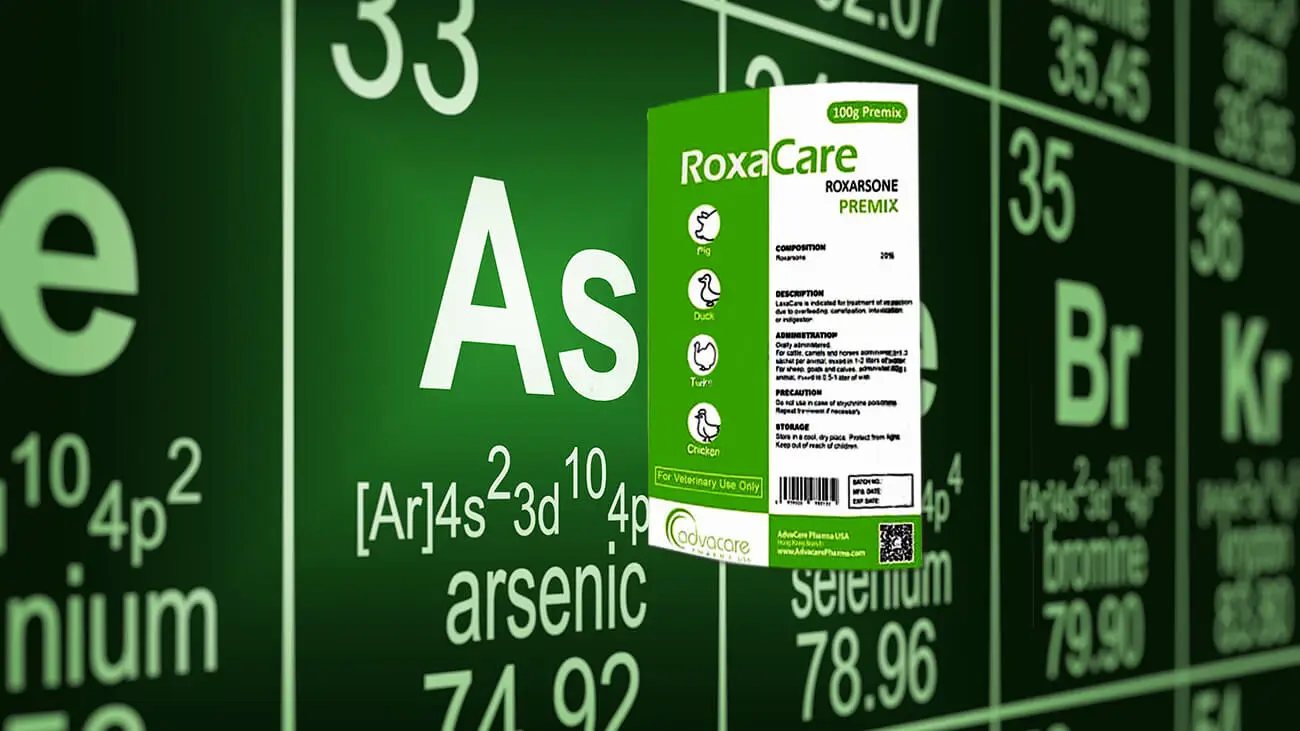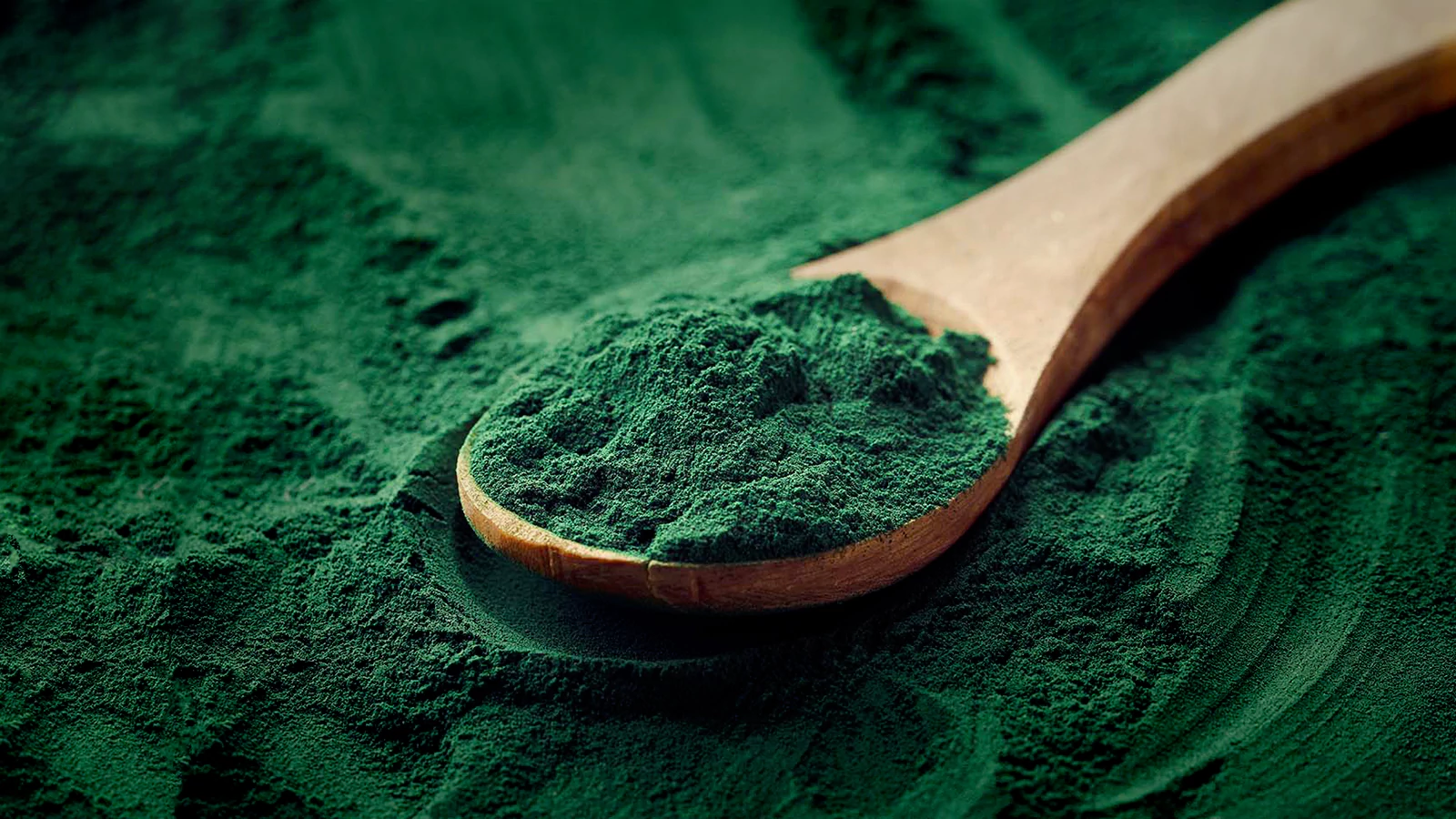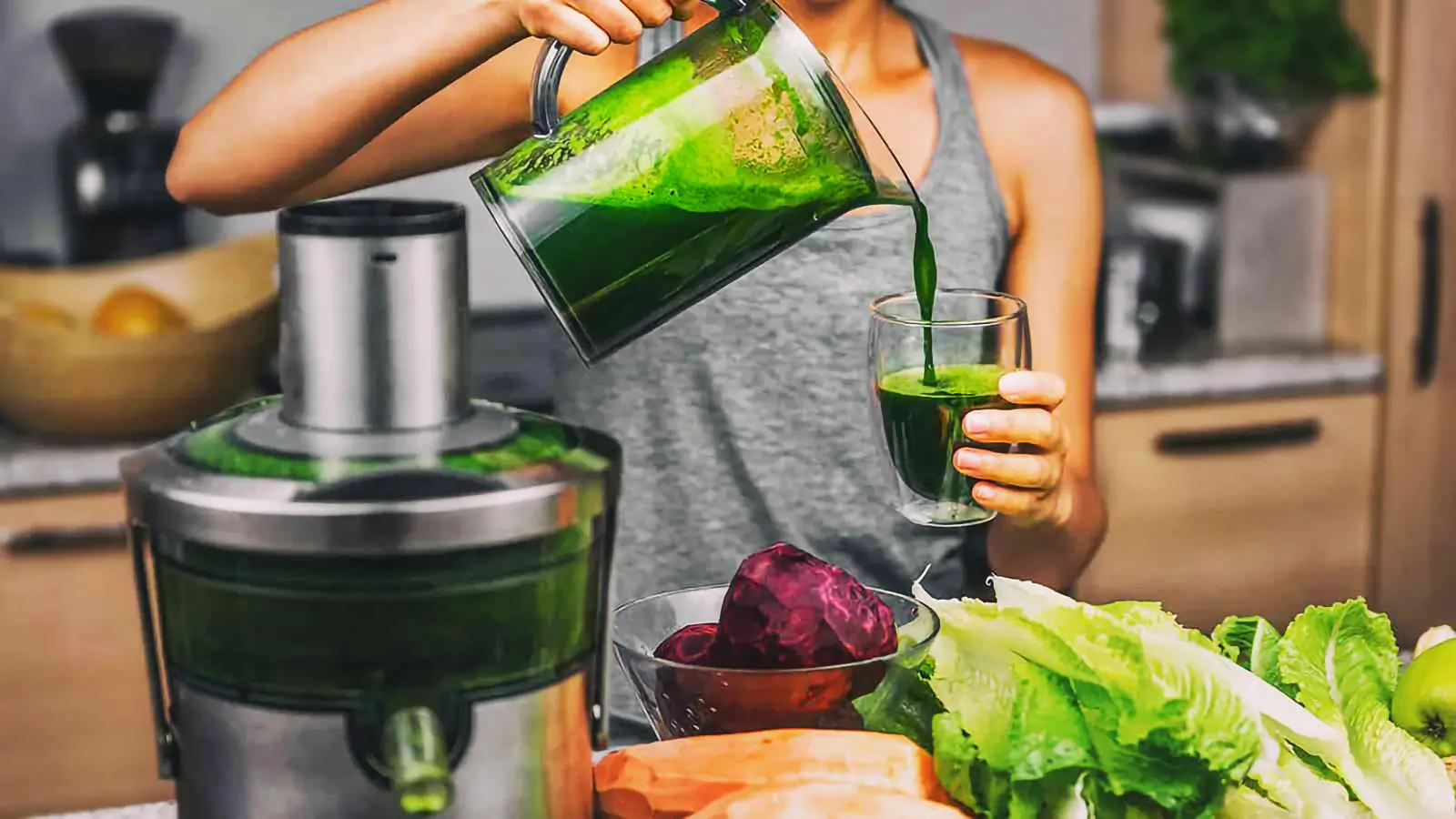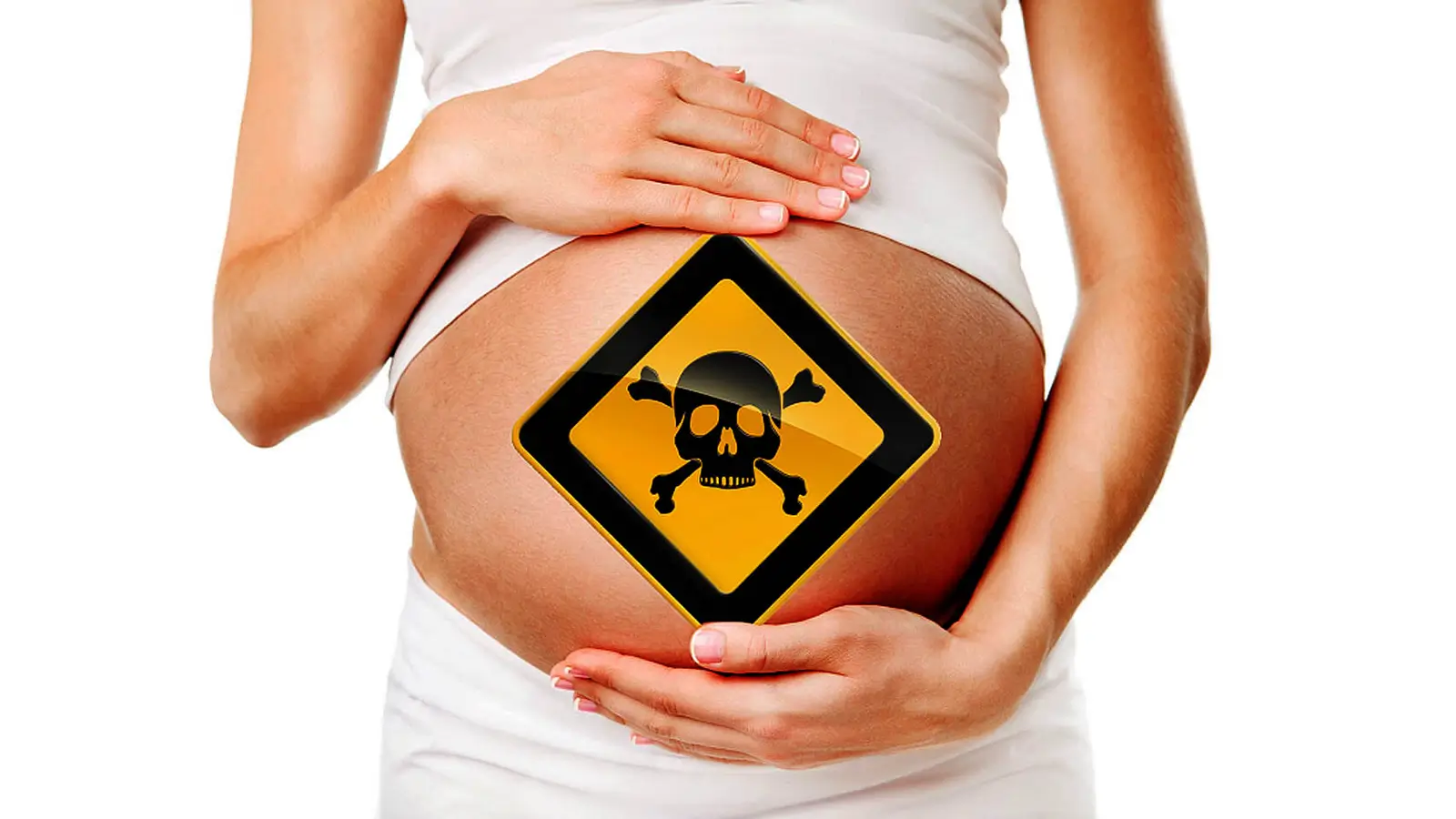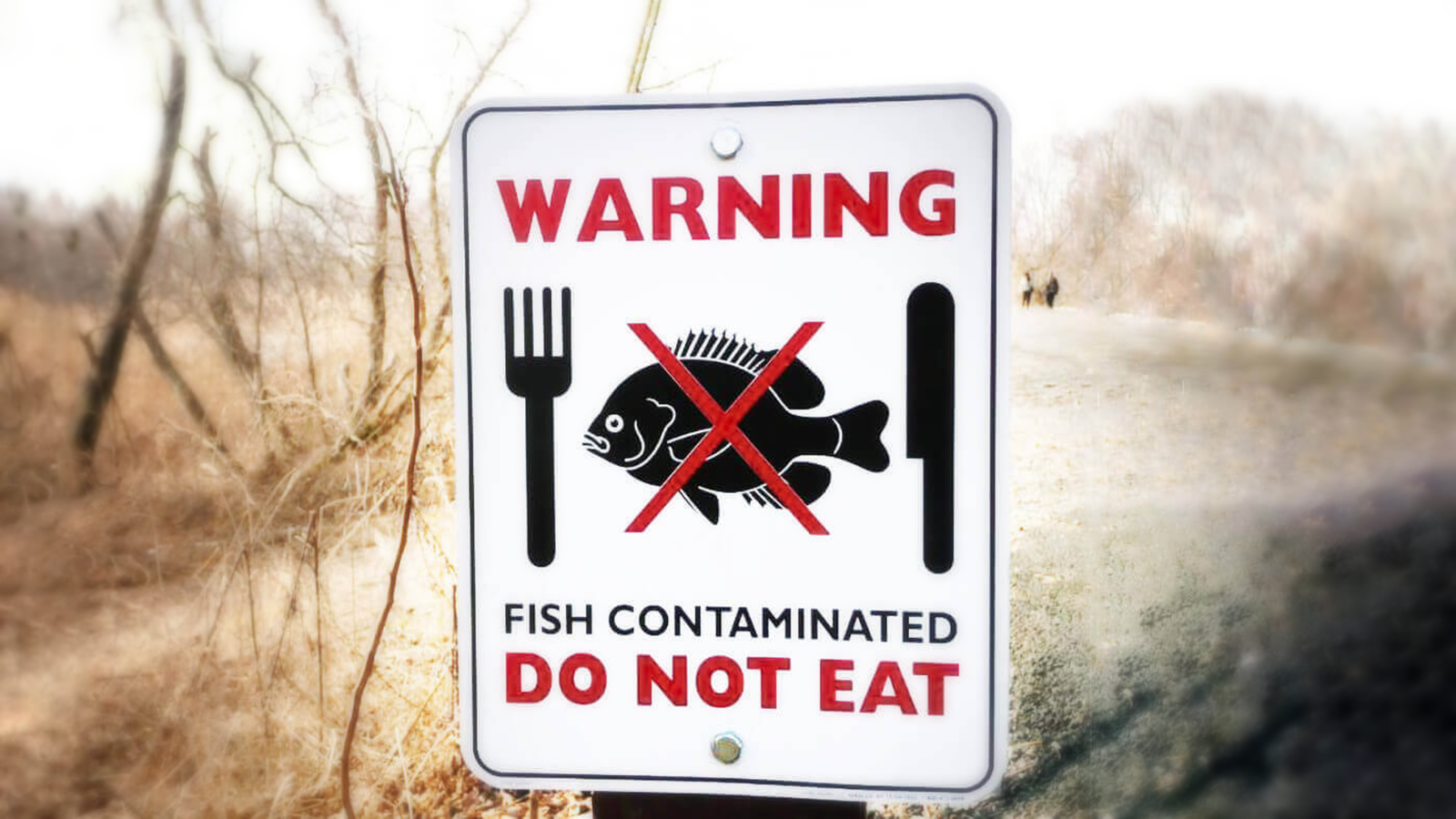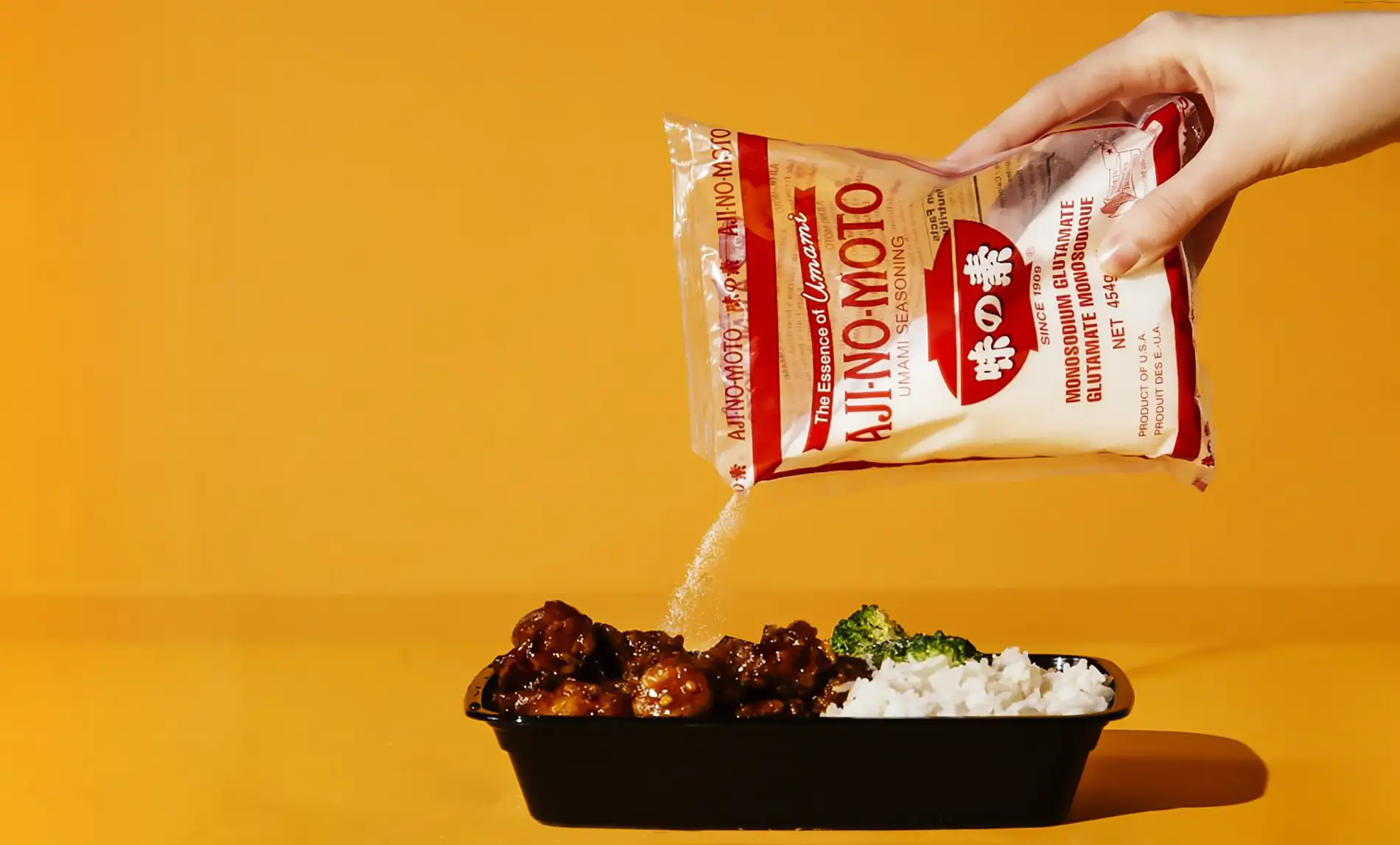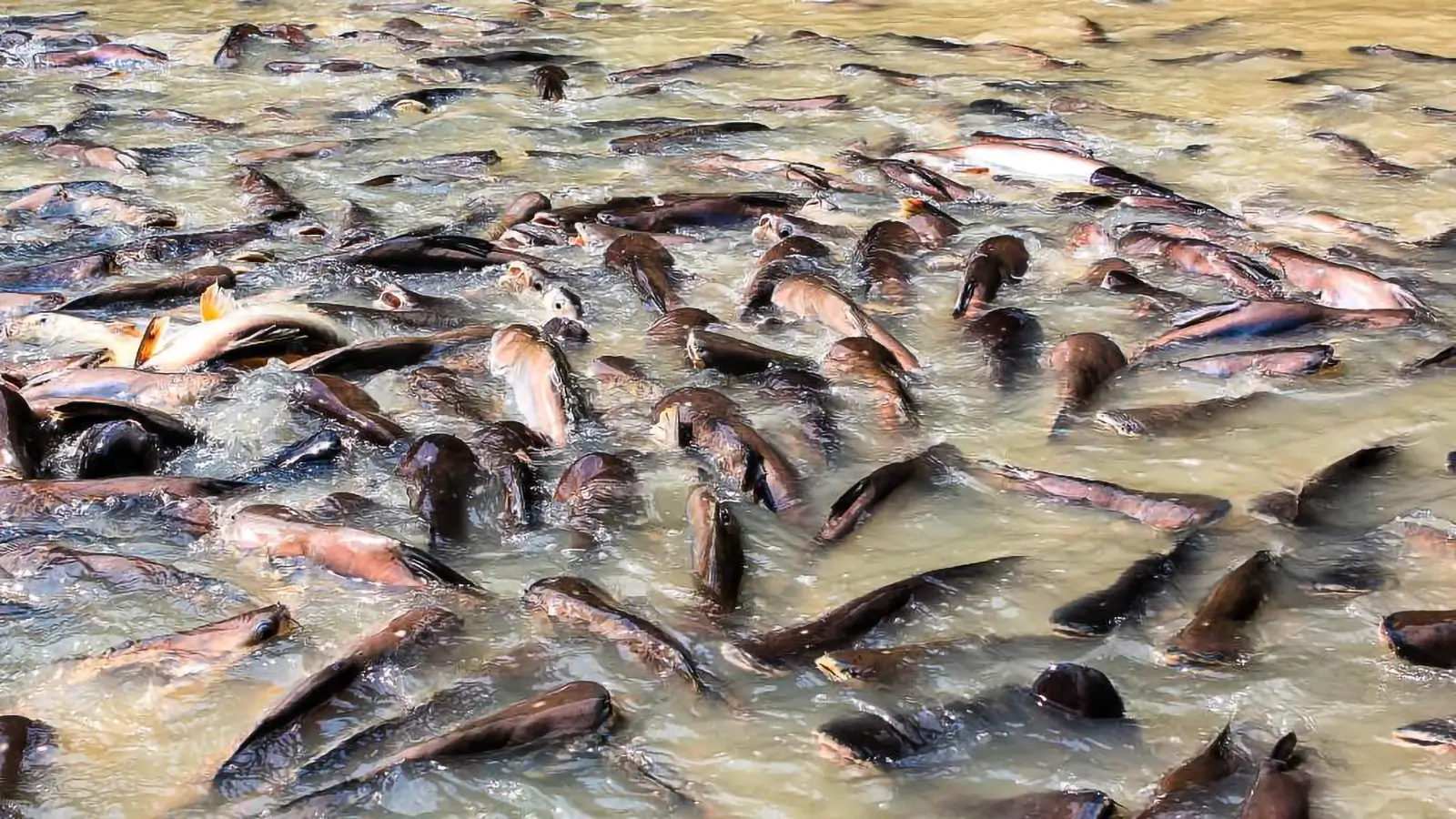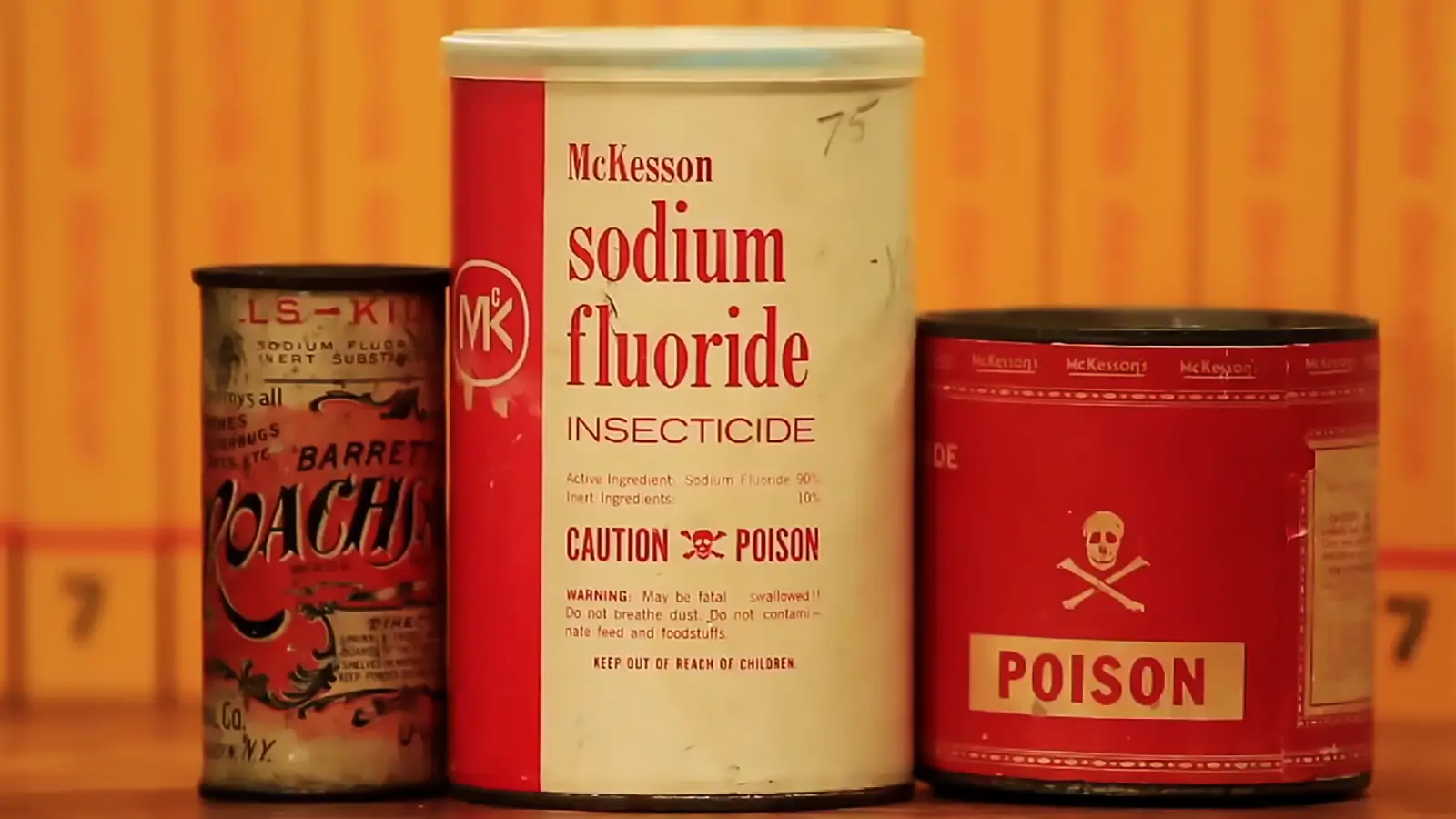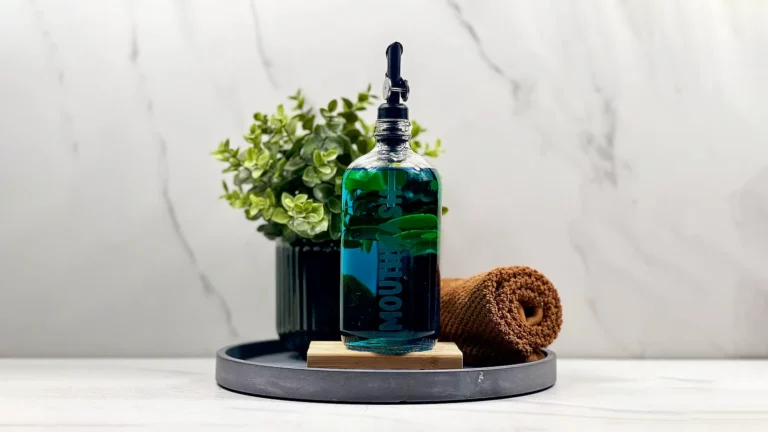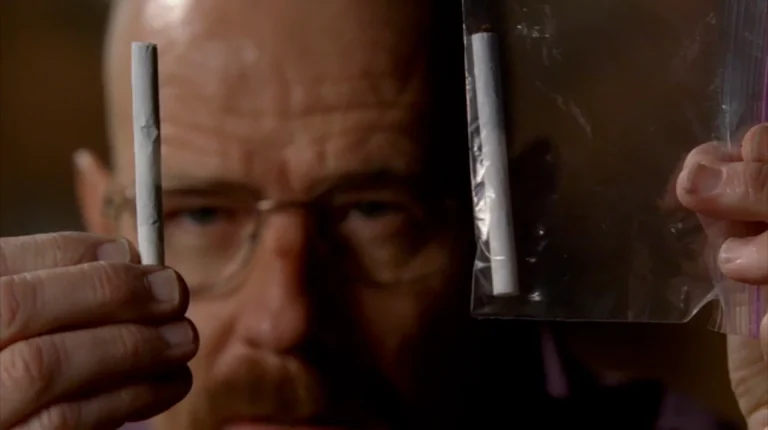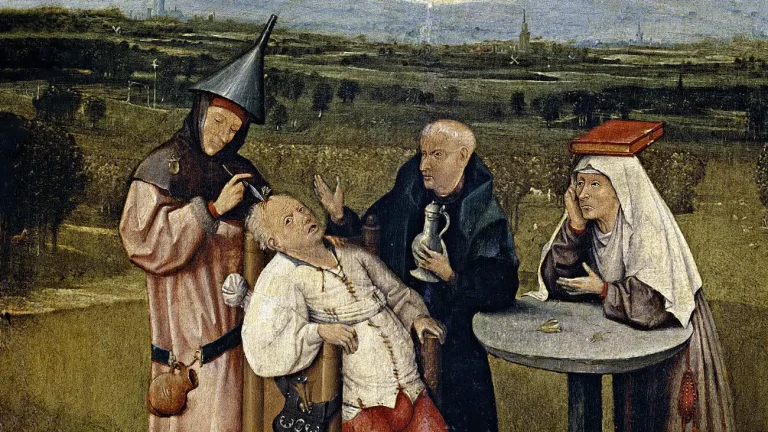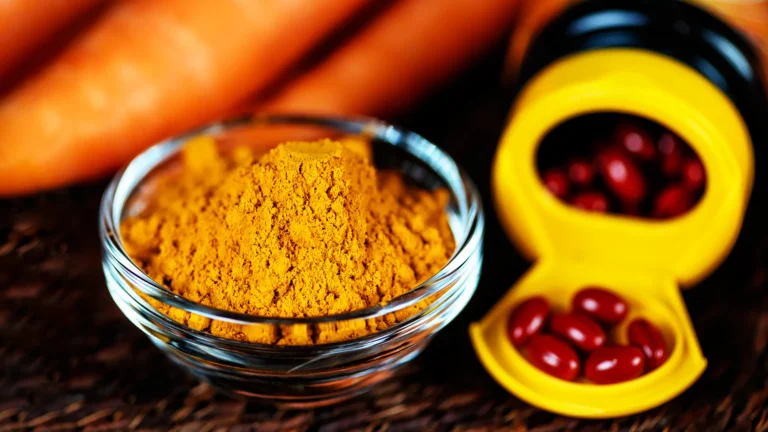Mercure - Neurotoxine du Poisson
Le mercure est une toxine industrielle et la substance la plus neurotoxique connue. Le plancton l'absorbera de l'eau de mer et initiera la bioaccumulation dans la chaîne alimentaire.
Milos Pokimica
Écrit par : Milos Pokimica
Examiné Médicalement Par : Dr. Xiùying Wáng, M.D.
Mis à jour le 9 juin 2023On nous apprend à considérer le poisson comme une forme saine de viande ou, du moins, comme un choix plus sain et meilleur. La raison en est que le poisson contient tous les acides gras oméga-3 dont nous avons besoin pour notre cerveau. Les acides gras oméga-3 doivent provenir de l'alimentation pour prévenir le déclin cognitif lié à l'âge. Les animaux terrestres ne contiennent pas d'oméga-3 s'ils ne sont pas délibérément nourris avec des graines de lin, comme c'est le cas pour les œufs oméga-3. Les œufs oméga 3 sont semblables aux œufs conventionnels, sauf que l'alimentation des poules est complétée par une source d'oméga 3, comme les graines de lin. Les poissons les obtiennent à partir d'algues qui les produisent et, lorsqu'ils mangent des algues, ils les transmettent tout au long de la chaîne alimentaire. En outre, le poisson a tendance à contenir moins de calories que les autres sources de viande, mais ce n'est pas toujours le cas.
Le problème est qu'il n'y a pas que les acides gras oméga-3 dans le poisson qui provient de l'eau de mer. Tout ce qui se trouve dans l'eau, quelle qu'en soit la concentration, sera filtré par les algues et concentré des dizaines et des centaines de fois plus. L'une des substances les plus neurotoxiques connues de l'humanité est présente dans l'eau de mer, alors qu'elle ne l'est pas dans l'eau douce, et que le plancton, ainsi que les algues, la captent et la bioaccumulent dans la chaîne alimentaire. Le mercure.
On nous apprend à considérer les poisons en fonction de la dose, car c'est ainsi que fonctionne la médecine moderne. Quelque chose est un poison, mais sa concentration est faible et il n'y a donc pas de problème. Il y a des effets secondaires, etc. "La dose fait le poison" (latin : "sola dosis facit venenum"). Il s'agit d'un adage destiné à indiquer un principe fondamental de la toxicologie. Il est attribué à Paracelse, alchimiste et père de la médecine moderne. Cet adage s'applique à certains produits chimiques, mais pas à tous. Certaines toxines causent des dommages, et je dirais même que la plupart d'entre elles causent des dommages quelle que soit l'exposition. Cela signifie que si nous ingérons ne serait-ce qu'une molécule d'une substance, elle causera des dommages. Ces dommages ne seraient pas suffisants pour nous tuer, mais ils se produiraient.
Le mercure en est un excellent exemple. Il est si toxique pour notre cerveau qu'il tue les cellules cérébrales au contact. Les dommages neurologiques sont les plus graves in utero. Au contact des neurones, le mercure provoque une atrophie neuronale. Lorsqu'il pénètre dans le cerveau, quelle que soit sa concentration, ne serait-ce qu'un atome, il cause de graves dommages. Si l'exposition est importante, elle provoque une atrophie neuronale grave sans aucune chance de guérison. Des études à long terme ont démontré que même une exposition prénatale minuscule à de très faibles concentrations peut entraîner une perte détectable dans les domaines de la mémoire, du langage et de la motricité. Les enfants y sont très sensibles et, s'ils sont touchés, ils peuvent souffrir d'une perte d'audition, d'une perte de vision, de troubles épileptiques, d'un retard de développement et de stigmates à long terme, notamment d'une déficience motrice. Pour une femme enceinte, il est interdit de manger du thon, quelle que soit la quantité. Par ailleurs, votre cerveau et votre corps peuvent être exposés au mercure toxique de bien d'autres manières, qu'il s'agisse d'un vaccin contre la grippe ou d'un plombage dentaire. Pour être raisonnable, une boîte de thon contient plus de mercure que 100 vaccins. Des études ont montré que les personnes ayant des amalgames dentaires peuvent avoir des concentrations de vapeur de mercure dix fois supérieures à celles des personnes qui n'en ont pas.
La consommation de poisson apporte des nutriments mais aussi du méthylmercure. Tous les poissons de mer, et pas seulement le thon, contiennent du méthylmercure (MeHg), certains plus et d'autres moins. L'effet toxique du mercure étant le plus destructeur pendant le développement du cerveau, l'exposition prénatale est la plus préoccupante. Le mercure est également une toxine cardiaque, et pas seulement cérébrale. Je vais donner un exemple pour mettre les choses en perspective.
Dans cette étude (Oken et al., 2008), ils ont analysé les liens entre la susceptibilité des enfants au mercure provenant à la fois du exposition à la grossesse de la mère et de la consommation de poisson. Le thimérosal des vaccins a été étudié ainsi que les impacts des amalgames dentaires sur le développement neurologique de l'enfant. Les vaccins du passé utilisaient quelque chose appelé thimérosal, qui est un conservateur contenant du mercure. Pour mettre cela en perspective.
Manger une seule portion de thon avait le même niveau de mercure que 100 (cent) vaccins au thimérosal.
Le résumé de l'étude était :
"L'exposition au mercure peut nuire au développement de l'enfant. Les interventions visant à réduire l'exposition à de faibles niveaux de mercure au début de la vie doivent cependant être soigneusement évaluées en tenant compte des effets nocifs potentiels des changements de comportement qui en résultent, tels que la réduction de l'exposition à l'acide docosahexaénoïque due à une consommation réduite de fruits de mer, une réduction de la vaccination des enfants et soins dentaires sous-optimaux."
Le thimérosal a été retiré de la plupart des vaccins administrés aux jeunes enfants en 2001, à l'exception du vaccin contre la grippe, qui en contient encore de petites quantités. Mais qu'en est-il de quelque chose de cent fois pire ? Une seule portion de thon en conserve. Combien de portions avons-nous mangées au cours de notre vie ? Et tous les autres poissons ? Il n'y a pas que le thon, tous les poissons contiennent du mercure, plus ou moins, et ce n'est pas seulement du mercure. Je n'utilise le mercure qu'à titre d'exemple. Il existe toute une liste d'autres métaux lourds comme le mercure qui resteront dans nos océans pour l'éternité et qui ne se biodégraderont jamais parce qu'il s'agit de particules élémentaires. Il existe également un millier d'autres polluants résistants non organiques qui ne se sont pas non plus dégradés et qui se sont bioaccumulés, ainsi que des microplastiques, et la liste n'est pas exhaustive. La raison pour laquelle cette toxine est très concentrée et très toxique à de tels niveaux dans le thon est que le thon est un poisson prédateur au sommet de la chaîne alimentaire. À la base de la chaîne alimentaire se trouvent le plancton et les algues qui filtrent l'eau de mer. La concentration de cette toxine dans l'eau peut alors être multipliée par dix ou cent, mais elle reste faible. Ces substances commencent à s'accumuler au fur et à mesure que l'on monte dans la chaîne alimentaire. Lorsque les plus gros poissons mangent les plus petits, ils mangent également toutes leurs toxines. Lorsque nous arrivons au sommet de la chaîne alimentaire, la situation est telle qu'elle est. La seule solution est de descendre dans la chaîne alimentaire.
Ne mangez pas de viande provenant des océans, et surtout pas de poissons prédateurs comme le thon. Il a été prouvé que même les suppléments de DHA obtenus par distillation moléculaire sont pollués par des métaux lourds et des toxines. Même l'huile de krill, que les gens ont commencé à substituer à l'huile de poisson pour éviter la pollution, s'est avérée polluée. Le krill a une durée de vie très courte et l'huile de krill est toujours très polluée. Si vous voulez des oméga 3, mangez du lin. Le lin contient des lignanes qui présentent un large éventail de bienfaits pour la santé, notamment la prévention du cancer du sein, des minéraux et des fibres, et constitue l'un des aliments les plus sains qui soient. Si vous voulez un supplément en tant que végétalien, vous pouvez toujours obtenir de l'huile DHA à base d'algues. Ne mangez jamais, et je le répète, quoi que ce soit provenant de la mer, même si vous êtes enceinte ou si vous êtes un enfant, si cela provient du règne animal océanique, que vous soyez végétalienne ou non. Si vous mangez du thon et que vous attendez un enfant, vous venez d'abaisser le QI de votre bébé d'une quantité mesurable, voire pire.
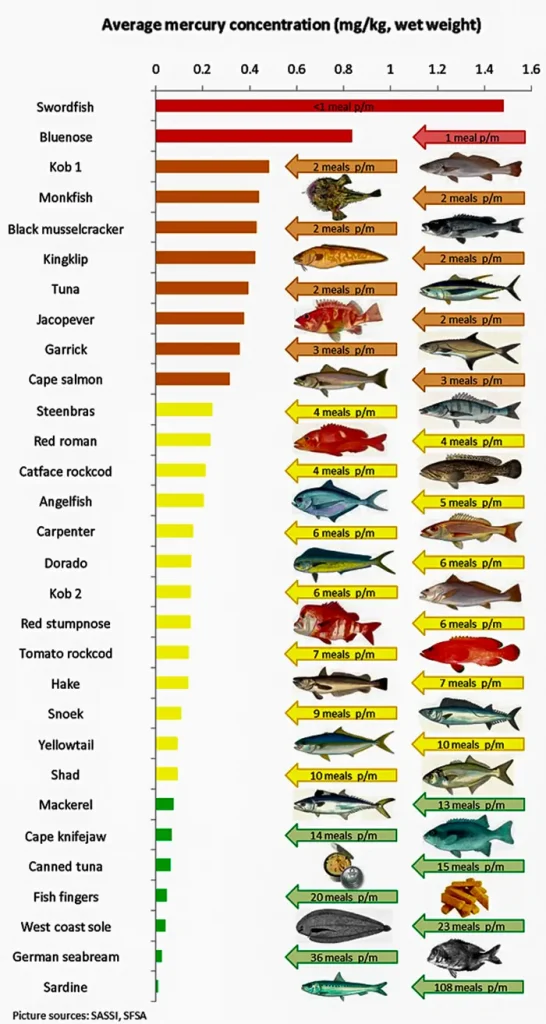
L'opinion publique s'est montrée très inquiète et méfiante à l'égard des vaccins et de la possibilité de liens avec l'autisme et d'autres maladies. En revanche, la consommation de poisson n'a pas soulevé de tollé. La toxicité du poisson est la première source de mercure dans le monde. La concentration de mercure dans le poisson est telle que, de l'avis général, certaines espèces de poisson devraient être interdites par la loi dans l'alimentation humaine. Une seule portion de poisson est pire que tous les vaccins que votre enfant recevra au cours de sa vie, si l'on s'en tient uniquement aux niveaux de mercure.
Qu'en est-il du cadmium ?
Qu'en est-il des PCB, PBDE, dioxines et pesticides chlorés ?
Le mercure étant une neurotoxine, on pensait qu'il était la cause sous-jacente du lien entre l'autisme et la vaccination. Aujourd'hui, de plus en plus d'enfants sont atteints d'autisme, même en l'absence de mercure dans les vaccins, et l'on estime que ce nombre va augmenter. Il s'agit d'un vaste sujet à analyser, et je dirai que la plupart des vaccins peuvent être dangereux en eux-mêmes et peuvent causer des dommages, mais ils sauvent beaucoup de vies et, en fin de compte, il reste la question de la confiance dans les entreprises qui fournissent ces vaccins.
Références :
- Oken, E., & Bellinger, DC (2008). Consommation de poisson, méthylmercure et développement neurologique de l'enfant. Opinion actuelle en pédiatrie, 20(2), 178–183. https://doi.org/10.1097/MOP.0b013e3282f5614c
Articles Similaires
Vous avez des questions sur la nutrition et la santé ?
J'aimerais avoir de vos nouvelles et y répondre dans mon prochain post. J'apprécie votre contribution et votre opinion et j'ai hâte d'avoir de vos nouvelles bientôt. Je vous invite également à nous suivre sur Facebook, Instagram et Pinterest pour plus de contenu sur l'alimentation, la nutrition et la santé. Vous pouvez y laisser un commentaire et entrer en contact avec d'autres passionnés de santé, partager vos conseils et expériences, et obtenir le soutien et les encouragements de notre équipe et de notre communauté.
J'espère que ce billet a été instructif et agréable pour vous et que vous êtes prêt à mettre en pratique les connaissances que vous avez acquises. Si vous avez trouvé ce billet utile, veuillez le partager à vos amis et à votre famille qui pourraient également en bénéficier. On ne sait jamais qui peut avoir besoin de conseils et de soutien dans son parcours de santé.
– Vous pourriez aussi aimer –

Apprendre la Nutrition
Milos Pokimica est docteur en médecine naturelle, nutritionniste clinique, rédacteur en santé médicale et nutrition et conseiller en sciences nutritionnelles. Auteur de la série de livres Devenir vegetarien ? Examen des sciences, il exploite également le site Web de santé naturelle GoVeganWay.com
Avis de non-responsabilité médicale
GoVeganWay.com vous propose des critiques des dernières recherches liées à la nutrition et à la santé. Les informations fournies représentent l'opinion personnelle de l'auteur et ne sont pas destinées ni implicitement à remplacer un avis médical professionnel, un diagnostic ou un traitement. Les informations fournies sont fournies à titre informatif uniquement et ne sont pas destinées à remplacer la consultation, le diagnostic et/ou le traitement médical d'un médecin ou d'un prestataire de soins de santé qualifié.NE JAMAIS IGNORER LES CONSEILS MÉDICAUX PROFESSIONNELS OU RETARDER LA RECHERCHE DE SOINS MÉDICAUX EN RAISON DE QUELQUE CHOSE QUE VOUS AVEZ LU OU ACCÉDÉ SUR GoVeganWay.com
N'APPLIQUEZ JAMAIS DE CHANGEMENTS AU STYLE DE VIE OU TOUT CHANGEMENT À LA SUITE DE QUELQUE CHOSE QUE VOUS AVEZ LU SUR GoVeganWay.com AVANT DE CONSULTER UN PRATICIEN MÉDICAL AGRÉÉ.
En cas d'urgence médicale, appelez immédiatement un médecin ou le 911. GoVeganWay.com ne recommande ni n'approuve aucun groupe, organisation, test, médecin, produit, procédure, opinion ou autre information spécifique pouvant être mentionné à l'intérieur.
Choix de l'éditeur -
Milos Pokimica est rédacteur spécialisé dans la santé et la nutrition et conseiller en sciences nutritionnelles. Auteur d'une série de livres Devenir vegetarien ? Examen des sciences, il exploite également le site Web de santé naturelle GoVeganWay.com
Derniers articles –
Top Des Nouvelles Sur la Santé - ScienceDaily
- The overlooked nutrition risk of Ozempic and Wegovyle février 4, 2026
Popular weight-loss drugs like Ozempic and Wegovy can dramatically curb appetite, but experts warn many users are flying blind when it comes to nutrition. New research suggests people taking these medications may not be getting enough guidance on protein, vitamins, and overall diet quality, increasing the risk of muscle loss and nutrient deficiencies.
- A 25-year study found an unexpected link between cheese and dementiale février 4, 2026
A massive Swedish study tracking nearly 28,000 people for 25 years found an unexpected link between full-fat dairy and brain health. Among adults without a genetic risk for Alzheimer’s, eating more full-fat cheese was associated with a noticeably lower risk of developing the disease, while higher cream intake was tied to reduced dementia risk overall. The findings challenge decades of low-fat dietary advice but come with important caveats.
- MIT’s new brain tool could finally explain consciousnessle février 4, 2026
Scientists still don’t know how the brain turns physical activity into thoughts, feelings, and awareness—but a powerful new tool may help crack the mystery. Researchers at MIT are exploring transcranial focused ultrasound, a noninvasive technology that can precisely stimulate deep regions of the brain that were previously off-limits. In a new “roadmap” paper, they explain how this method could finally let scientists test cause-and-effect in consciousness research, not just observe […]
- Why heart disease risk in type 2 diabetes looks different for men and womenle février 4, 2026
Scientists are digging into why heart disease risk in type 2 diabetes differs between men and women—and sex hormones may be part of the story. In a large Johns Hopkins study, men with higher testosterone had lower heart disease risk, while rising estradiol levels were linked to higher risk. These hormone effects were not seen in women. The results point toward more personalized approaches to heart disease prevention in diabetes.
- Sound machines might be making your sleep worsele février 4, 2026
Sound machines may not be the sleep saviors many believe. Researchers found that pink noise significantly reduced REM sleep, while simple earplugs did a better job protecting deep, restorative sleep from traffic noise. When pink noise was combined with outside noise, sleep quality dropped even further. The results suggest that popular “sleep sounds” could be doing more harm than good—particularly for kids.
- This unexpected plant discovery could change how drugs are madele février 3, 2026
Plants make chemical weapons to protect themselves, and many of these compounds have become vital to human medicine. Researchers found that one powerful plant chemical is produced using a gene that looks surprisingly bacterial. This suggests plants reuse microbial tools to invent new chemistry. The insight could help scientists discover new drugs and produce them more sustainably.
- A hidden cellular process may drive aging and diseasele février 3, 2026
As we age, our cells don’t just wear down—they reorganize. Researchers found that cells actively remodel a key structure called the endoplasmic reticulum, reducing protein-producing regions while preserving fat-related ones. This process, driven by ER-phagy, is tied to lifespan and healthy aging. Because these changes happen early, they could help trigger later disease—or offer a chance to stop it.
PubMed, #régime-vegan –
- Diet type and the oral microbiomele février 2, 2026
CONCLUSION: The diet-oral microbiome-systemic inflammation axis is bidirectional and clinically relevant. Understanding both direct ecological regulation and indirect metabolic effects is essential to support precision nutrition strategies aimed at maintaining oral microbial balance and systemic inflammatory risk mitigation.
- Consensus document on healthy lifestylesle janvier 22, 2026
Proteins are a group of macronutrients that are vital to our lives, as they perform various functions, including structural, defensive and catalytic. An intake of 1.0-1.2 g/kg/body weight per day would be sufficient to meet our needs. Carbohydrate requirements constitute 50 % of the total caloric value and should be obtained mainly in the form of complex carbohydrates. In addition, a daily intake of both soluble and insoluble fiber is necessary. Regular consumption of extra virgin olive oil […]
- Vitamin B12 and D status in long-term vegetarians: Impact of diet duration and subtypes in Beijing, Chinale janvier 21, 2026
CONCLUSIONS: This study reveals a dual challenge among Beijing long-term vegetarians: vitamin B12 deficiency was strongly associated with the degree of exclusion of animal products from the diet (veganism), while vitamin D deficiency was highly prevalent and worsened with longer diet duration. The near-universal vitamin D deficiency observed in this study suggests that, in the Beijing context, the risk may extend beyond dietary choice, potentially reflecting regional environmental factors;…
- Nutritional evaluation of duty meals provided to riot police forces in Germanyle janvier 13, 2026
Background: The primary role of the German riot police is maintaining internal security. Due to challenging working conditions, riot police forces face an elevated risk of various diseases. During duty, forces are provided with meals. A balanced diet can reduce the risk of some of these diseases and contribute to health-promoting working conditions. Aim: First evaluation of the nutritional quality of duty meals in Germany based on German Nutrition Society recommendations (DGE). Methods: In…
- Iodinele janvier 1, 2006
Iodine is an essential trace nutrient for all infants that is a normal component of breastmilk. Infant requirements are estimated to be 15 mcg/kg daily in full-term infants and 30 mcg/kg daily in preterm infants.[1] Breastmilk iodine concentration correlates well with maternal urinary iodine concentration and may be a useful index of iodine sufficiency in infants under 2 years of age, but there is no clear agreement on a value that indicates iodine sufficiency, and may not correlate with […]
Messages aléatoires –
Postes en vedette -
Dernières Nouvelles de PubMed, #alimentation végétale –
- From paddy soil to dining table: biological biofortification of rice with zincpar Lei Huang le février 4, 2026
One-third of paddy soils are globally deficient in zinc (Zn) and 40% of Zn loss in the procession from brown rice to polished rice, which results in the global issue of hidden hunger, e.g., the micronutrient deficiencies in the rice-based population of developing countries. In the recent decades, biofortification of cereal food crops with Zn has emerged as a promising solution. Herein, we comprehensively reviewed the entire process of Zn in paddy soil to human diet, including the regulatory…
- Molecular Characterization of Tobacco Necrosis Virus A Variants Identified in Sugarbeet Rootspar Alyssa Flobinus le février 3, 2026
Sugarbeet provides an important source of sucrose; a stable, environmentally safe, and low-cost staple in the human diet. Viral diseases arising in sugarbeet ultimately impact sugar content, which translates to financial losses for growers. To manage diseases and prevent such losses from occurring, it is essential to characterize viruses responsible for disease. Recently, our laboratory identified a tobacco necrosis virus A variant named Beta vulgaris alphanecrovirus 1 (BvANV-1) in sugarbeet…
- Nutrition in early life interacts with genetic risk to influence preadult behaviour in the Raine Studypar Lars Meinertz Byg le février 3, 2026
CONCLUSIONS: Nutrition in early life and psychiatric genetic risk may interact to determine lasting child behaviour. Contrary to our hypothesis, we find dietary benefits in individuals with lower ADHD PGS, necessitating replication. We also highlight the possibility of including genetics in early nutrition intervention trials for causal inference.
- Effect of the gut microbiota on insect reproduction: mechanisms and biotechnological prospectspar Dilawar Abbas le février 2, 2026
The insect gut microbiota functions as a multifunctional symbiotic system that plays a central role in host reproduction. Through the production of bioactive metabolites, gut microbes interact with host hormonal pathways, immune signaling, and molecular regulatory networks, thereby shaping reproductive physiology and fitness. This review summarizes recent advances in understanding how gut microbiota regulate insect reproduction. Accumulating evidence demonstrates that microbial metabolites…
- Rationale and design of a parallel randomised trial of a plant-based intensive lifestyle intervention for diabetes remission: The REmission of diabetes using a PlAnt-based weight loss InteRvention…par Brighid McKay le février 2, 2026
CONCLUSIONS: This trial will provide high-quality clinical evidence on the use of plant-based ILIs to address the epidemics of obesity and diabetes to inform public health policies and programs in Canada and beyond.
- Diet type and the oral microbiomepar Daniel Betancur le février 2, 2026
CONCLUSION: The diet-oral microbiome-systemic inflammation axis is bidirectional and clinically relevant. Understanding both direct ecological regulation and indirect metabolic effects is essential to support precision nutrition strategies aimed at maintaining oral microbial balance and systemic inflammatory risk mitigation.
